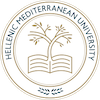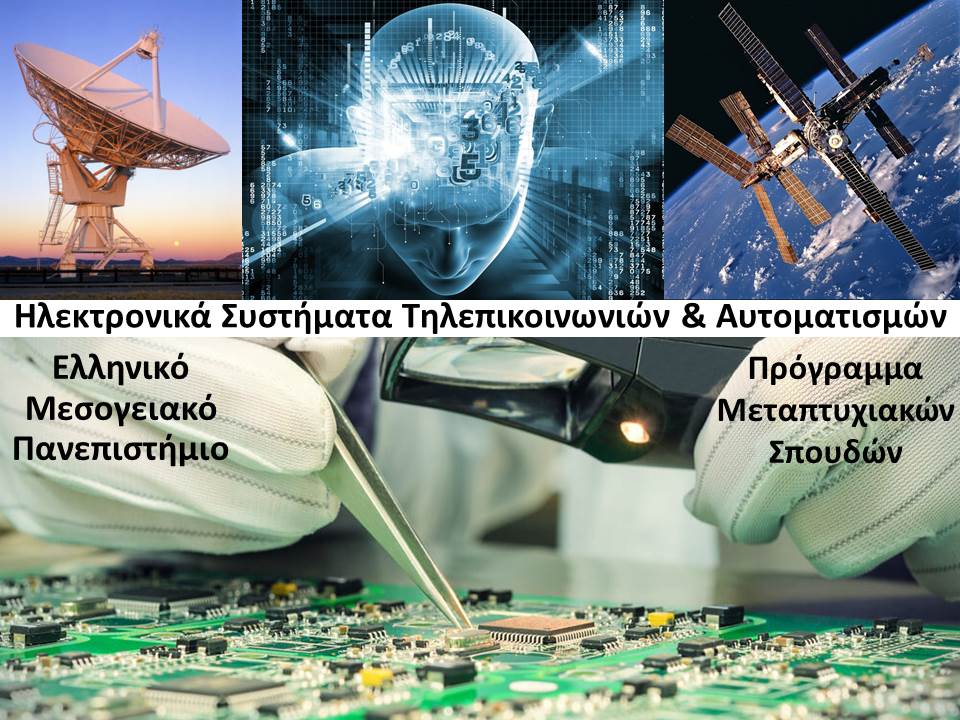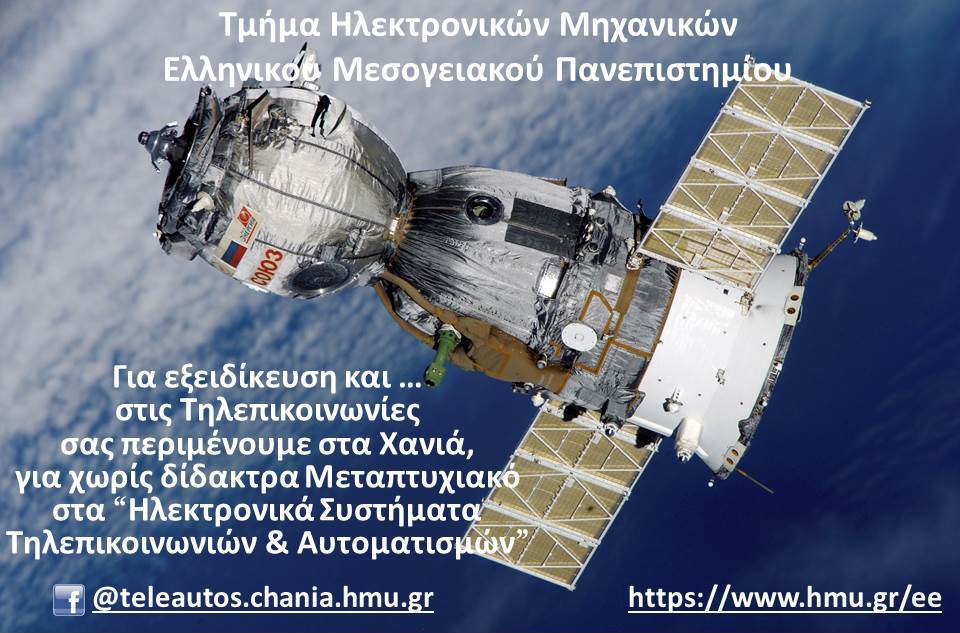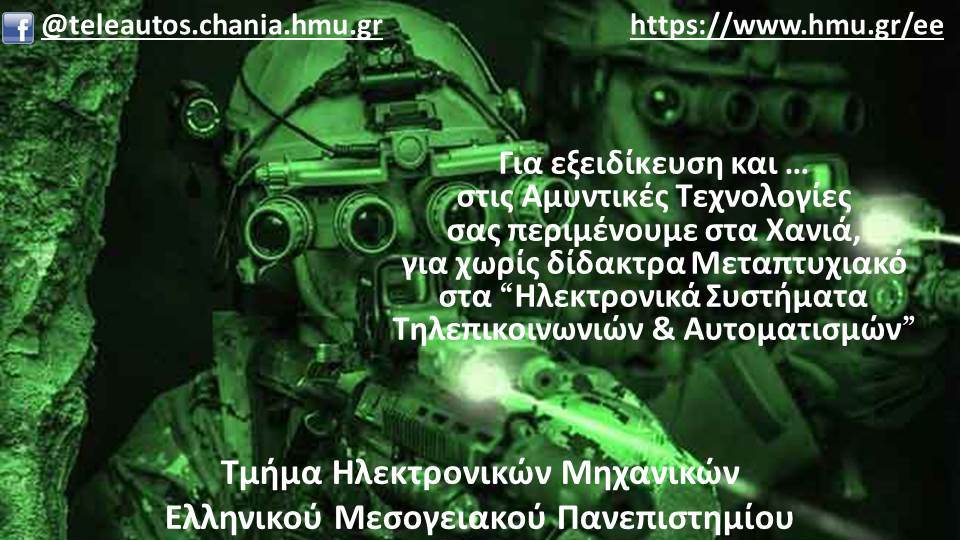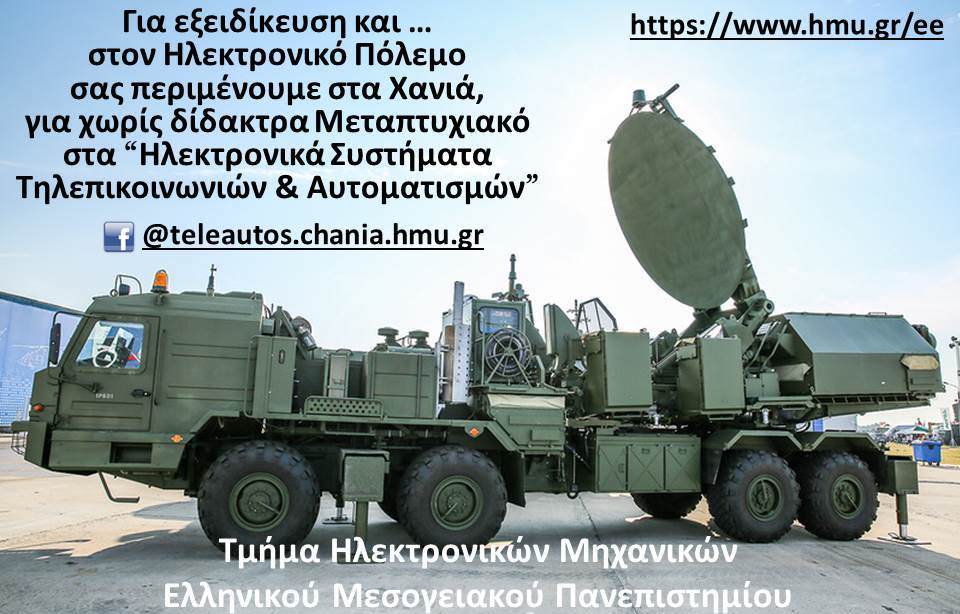Announcements
Announcement for the exams of the postgraduate courses of the winter semester 2019-20
Beginning of Spring Semester 2019-20: 2-3-2020
Announcement for the schedule of postgraduate courses of the spring semester 2019-20
Description
The Department of Electronic Engineering of the Hellenic Mediterranean University organizes in Chania the Postgraduate Studies Program (MSc) “Electronic Systems of Telecommunications & Automation”.
The MSc, which has a normal duration of three (3) semesters (and a maximum duration of six (6) semesters):
- was originally established by Government Gazette 2556 / t.B / 19-8-2016
- was re-established with the Government Gazette 2068 / t.B / 7-6-2018
- and was re-established by the Government Gazette 3281 / τ.Β / 27-8-2019 (according to par. 10 of article 55 of Law 4610/2019, the decision of 2 / 28-5-2019 of the Assembly of the Department and the corresponding decision of 6 / 27-6-2019 Senate of the Foundation).
- or 8 postgraduate courses and 1 postgraduate dissertation,
- or 12 postgraduate courses.
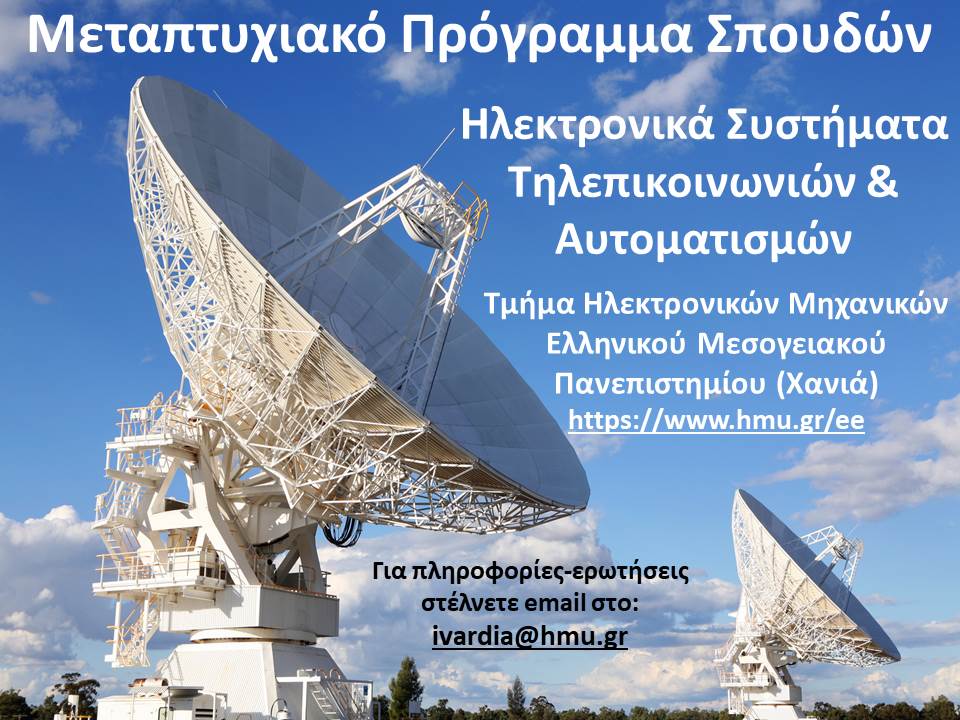
MSc No Tuition, No Tuition Fees, No Registration Fees
Although the aim of the MSc is its self-financed operation, the study at the MSc is free and there are NO registration fees, tuition fees, or tuition fees.
Full-time students:
+ in the first semester they choose and attend 4 (of the offered) courses,
+ in the 2nd semester they also select and attend 4 more (of the offered) courses, while
+ in the 3rd semester, either they prepare a postgraduate diploma thesis, or they choose and attend an additional 4 (of the offered) courses.
Part-time students:
in each of the (up to at most) 6 semesters of study choose and attend a number of postgraduate courses (from those offered in the respective semester) depending on their obligations and capabilities, until they complete 90 credit ECTS credits (or (a) with attendance 8 courses and the elaboration of a postgraduate diploma thesis, or (b) with the attendance of a total of 12 postgraduate courses).
In the MSc they are accepted after selection:
- graduates of Schools and Departments of Engineering (such as Electronic Engineers, Electrical Engineers & Computer Engineers, Mechanical Engineers, Computer Engineers, Environmental Engineers, Production Engineers, etc.),
- graduates of Positive and Technological Sciences (such as Physicists, Computer Science, Materials Science, Mathematicians, Agronomists, Geologists, etc.),
- graduates of Military Schools (Army, Navy and Air Force),
- graduates of Security Corps Schools,
- graduates of other related specialties with a solid background in mathematics and/or physics,
- but also graduate students for whom only a few formal obligations for obtaining their degree during the first semester are pending.
Maximum number of entrants
The maximum number of entrants in each course of the MSc is 15 people.
Employees postgraduate students
There is special care for working students so that they have the opportunity to partially study and complete the MSc within (up to a maximum of) six semesters.
Applications for postgraduate students
Applications for participation in the MSc are submitted electronically to the Secretariat of the Department of Electronic Engineering, by sending emails to Ms. Kalliopi Gatzouni (gatzouni@hmu.gr) and Ms. Niki Geitona (gitona@hmu.gr).
Candidate postgraduate students are required to submit the following electronically:
- application form based on the relevant template in word file format
- certified degree and detailed grading
- detailed CV
- Certificate or responsible statement of English language proficiency
- the contact details of two persons who know the candidate and agree to receive communication to provide their opinion or two letters of recommendation, and
- short text of study intentions based on the relevant template in word file format
Selection of admitted postgraduate students
The selection of students admitted to the MSc is based on a system of points, for the calculation of which are taken into account:
- the relevance and degree of the degree,
- possible professional experience in the subject,
- the personal interview, and
- good knowledge of English.
Candidates who collect the most points are selected.
The object of the MSc
The aim of the MSc “Electronic Telecommunications & Automation Systems” is to provide a high level of specialized knowledge, innovative experiences, and applied skills in the cutting-edge technologies of telecommunications, electronics, automation, computers, and computer science.
The purpose of the MSc “Electronic Telecommunications and Automation Systems” is to train graduates of the Departments of Engineering, Armed Forces, Security Forces, Positive & Technological Sciences and other related specialties, to develop high-level telecommunications skills in their research skills and to create electronics, automation, IT and their applications. By equipping students with the necessary knowledge and skills, enabling graduates to engage academically and professionally in the international environment, and promoting research in the leading areas of cutting-edge technology, the MSc promotes scientific knowledge, moving in the direction of the main developing countries. , meets the modern needs of society and provides a field for high-level research and development activities.
Aims of the MSc
The objectives of the MSc “Electronic Telecommunications and Automation Systems” are:
- To give graduates the knowledge, skills, and abilities required by the labor market at national, European, and international levels.
- To improve the capabilities of graduates in order, through the full utilization of modern cutting-edge technologies, to develop autonomous business and innovative actions, or to develop products or knowledge-intensive units.
- To update and enhance the knowledge and skills of professionals already working in the fields of electronics, telecommunications, automation, information technology, and their applications, in order to be able to meet the challenges of ever-evolving cutting-edge technologies.
- Focus on available electronic technology and its applications in telecommunications, automation, and computers, using appropriate development tools at the level of design, implementation, and optimization of hardware, software, and systems.
- To ensure in the small and large units of the productive industry and craft, but also in the enterprises and organizations of the public and private sector, specialized human resources with know-how and adaptability in the development of new innovative products and services, for design, development, control, and the optimization of electronic systems.
- To lead to the design and production of innovative and competitive products and services with low cost and production time, but high functionality and reliability, to incorporate cutting-edge technologies, to offer optimal quality features, and to fully meet the requirements of the intermediate and end-user.
Features of the graduates of the MSc
MSc graduates gain knowledge, skills, and abilities to:
- Use and develop complex methodologies, electronic systems, and technological applications.
- To staff any company or organization or production unit in the public and private sector in Greece and abroad, covering the needs of specialized staff with high demands.
- To operate as self-employed in the technological field of study, design, and application of cutting-edge technologies, developing their own business activities in the fields of electronics, telecommunications, automation, and information technology.
- To promote basic and applied research and to pursue doctoral studies.
Director of the MSc
- Associate Professor Ioannis Vardiabasis
- Vardiabasis Ioannis, Associate Professor and Director of the MSc
- Kouridakis Stylianos, Lecturer
- Konstantaras Antonios, Associate Professor and President of the Department
- Petrakis Nikolaos, Lecturer
- Hatzakis Ioannis, Associate Professor and Assoc. Director of the MSc
MSc Study Guide
Requirements for successful completion of the MSc
Postgraduate courses
For the successful completion of the MSc, postgraduate students can choose either 8 or 12 of the total of 18 courses offered:
- Applied Electronics: Power & High Frequency
- Broadband Communications
- Programming Techniques and Algorithms
- Built-in Systems
- Technological Entrepreneurship & Techno-Economic Analysis
- Optical Networks and Opto Electronic Systems
- Defense Technologies and Electromagnetic Compatibility
- Wireless Networks and Mobile Communications
- Mechatronics
- Parallel Editing and Computational Networks
- Entertainment, Dissemination and Radiation of Electromagnetic Waves
- Microwave – Millimeter Wave Communications and Antennas
- Non-Destructive Control Technologies
- Polymer Electronics
- Special Issues of Measurement Systems
- Skills and Ethics in Science
- Deep Mechanical Learning
- Digital Systems Solvency
Those who choose 8 (and not 12) postgraduate courses, in order to complete the program, prepare a master’s thesis and write a corresponding dissertation.
Postgraduate thesis
Completed
- Avvanidou Sofia, “Design with the HFSS software package and development of a cross-printed microfilm antenna”. Supervisor: I. Vardiabasis. Three-member Advisory / Examination Committee: I. Vardiabasis – G. Liodakis – Th. Kapetanakis. It was successfully examined on 23-10-2019.
- Lampou Anna, “Predicting the heart rate of athletes using neural networks”. Supervisor: I. Vardiabasis. Three-member Advisory / Examination Committee: I. Vardiabasis – M. Zakynthinaki – Th. Kapetanakis. It was successfully examined on 23-10-2019.
- Maragoudakis Antonios, “Design and implementation of a neural network of deep learning using CUDA C”. Supervisor: A. Konstantaras. Three-member Advisory / Examination Committee: A. Konstantaras – E. Antonidakis – E. Kokkinos. It was successfully examined on 5-11-2019.
- Sarantopoulos Ioannis, “Alternative communication and information system in case of crises”. Supervisor: E. Antonidakis. Three-member Advisory / Examination Committee: E. Antonidakis – I. Vardiabasis – E. Kokkinos. It was successfully tested on 7-2-2020.
- Frantzeskakis Lambros, “Long-distance IoT communications network for water management in rural areas”. Supervisor: E. Antonidakis. Three-member Advisory / Examination Committee: E. Antonidakis – I. Hatzakis – E. Kokkinos. It was successfully tested on 7-2-2020.
In progress
- Arvanitis Stergios, “Study and implementation of a program in C ++ to simulate the production process type job shop”. Supervisor: N. Petrakis. Three-member Advisory / Examination Committee: N. Petrakis -.
- Valmas Georgios, “Study of a mobile phone system installed on a plane”. Supervisor: E. Kokkinos. Three-member Advisory / Examination Committee: E. Kokkinos – I. Vardiabasis – S. Kouridakis.
- Giakoumakis Panagiotis, “Development and construction of an energy collection system from low light sources, indoors and outdoors”. Supervisor: S. Kouridakis. Three-member Advisory / Examination Committee: S. Kouridakis – I. Hatzakis – E. Kokkinos.
- Zervoudakis Antonios, “MEDIBERRY – Automatic drug distributor using Raspberry Pi”. Supervisor: A. Konstantaras. Supervisor: A. Konstantaras. Three-member Advisory / Examination Committee: A. Konstantaras – E. Antonidakis – E. Kokkinos.
- Kapasakis Emmanouil, “Remote control and management of autonomous energy installations”. Supervisor: A. Konstantaras. Three-member Advisory / Examination Committee: A. Konstantaras – E. Antonidakis – E. Kokkinos.
- Marinakis Ioannis, “Electrical designation of conventional MOS and MIS capacitors with polymeric semiconductor thin layers”. Supervisor: E. Kapetanakis. Three-member Advisory / Examination Committee: E. Kapetanakis – V. Saltas – K. Petridis.
- Papavassiliou Vlasios, “Increasing the influx of tourists through the targeted promotion of local community activities on social networking sites based on the personalized interests of users.” Supervisor: A. Konstantaras. Three-member Advisory / Examination Committee: A. Konstantaras – E. Antonidakis – E. Kokkinos.
Mobility via Erasmus +
- on the website of the MSc https://www.hmu.gr/ee/el/σελίδες-μενού/πμσ-ηλεκτρονικά-συστήματα-τηλεπικοινωνιών-αυτοματισμών-ηστα, and
- on the social networking page of the MSc https://www.facebook.com/Μεταπτυχιακό-Master-Ηλεκτρονικά-Συστήματα-Τηλεπικοινωνιών-Αυτοματισμών-106962153995606 (in which we invite you to state that “You like” in order to be informed in real-time about anything the MSc).
The Secretariat of the MSc is located at the headquarters of the Department (Address: Romanou 3, Halepa, 73133 Chania).
By phone, you can contact Ms. Kalliopi Gatzouni (28210 23008), or Mrs. Niki Geitona (28210 23059).
If you need fax communication, then you can use 28210 23003.
- Government Gazette 3281 / τ.Β / 27-8-2019 New Re-establishment of MSc TeleAutoS
- Government Gazette 2068 / τ.Β / 7-6-2018 Re-establishment of TeleAutoS MSc
- Government Gazette 4532 / t.B / 17-10-2018 Internal Regulations for the Operation of TeleAutoS MSc
- Government Gazette 2556 / τ.Β / 19-8-2016 Initial Establishment of TeleAutoS MSc
- Previous Internal Regulations for the Operation of TeleAutoS MSc
- From 16-09-2019 Minutes of the 2nd Meeting of the Coordinating Committee of the TeleAutoS MSc
- From 24-06-2019 Minutes of the 1st Meeting of the Coordinating Committee of TeleAutoS MSc
- From 28-05-2019 Decision of the Assembly 2 / 28-5-2019 Department for the re-establishment of the TeleAutoS MSc at the Department of Electronic Engineering of the Hellenic Mediterranean University
- From 19-06-2018 Decision of the Assembly 131 / 19-6-2018 Department for the election of the 5-member Coordinating Committee and the appointment of the Director and Assoc. Director of TeleAutoS MSc
Hours Postgraduate Programs
- Schedule of the Postgraduate Program of Spring 2019-20
- Schedule of the Postgraduate Program of Winter 2019-20
- Schedule of the Postgraduate Program of Spring 2018-19
- Schedule of the Postgraduate Program of Winter 2018-19
- Schedule of the Postgraduate Program of Spring 2017-18
- Schedule of the Postgraduate Program of Winter 2017-18
- Schedule of the Postgraduate Program of Spring 2016-17
Postgraduate Examination Programs MSc
- Postgraduate Examination Program for Winter 2019-20
- Postgraduate Examination Program for Spring 2018-19
- Postgraduate Examination Program for Winter 2018-19
- Postgraduate Examination Program for Spring 2017-18
- Postgraduate Examination Program for Winter 2017-18
- Postgraduate Examination Program for Spring 2016-17
Useful Documents
- Standard Request for Postgraduate Diploma Thesis
- Standard Postgraduate Examination Practice
- 2019 Applicant Registration Application for the Winter Semester 2019-20 and pdf
- Application for Registration Renewal for the Spring Semester 2018-19
Applications for Participation
Annual Revenue – Expenses
- Annual Accounts of Revenue – Expenses for the years 2016-2017 (according to par. 6 of article 37 and par. 6 of article 85 of Law 4485/2017).
- Annual Revenue – Expenditure Reports of “Electronic Telecommunications & Automation Systems” for the years 2012-2017 (according to par. 6 of article 37 and par. 6 of article 85 of Law 4485/2017).

